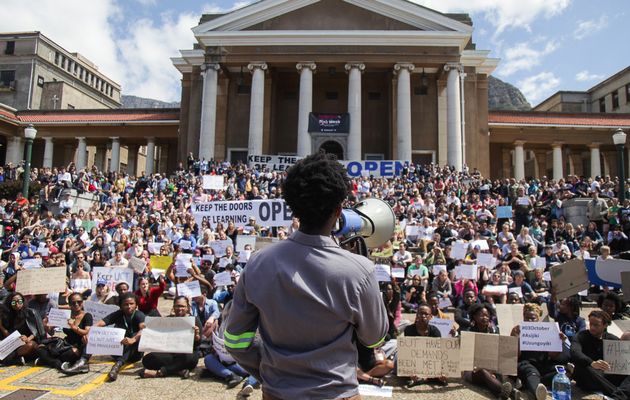África/Sudáfrica/Octubre de 2016/Autora: Lynsey Chutel/Fuente: Quartz
RESUMEN: El presidente de Sudáfrica, Jacob Zuma, tenía 21 años cuando fue condenado por intentar derrocar al gobierno del apartheid y condenado a prisión 1963. En la actualidad, dirige un gabinete que incluye ministros que comenzaron sus carreras políticas como activistas juveniles. activismo de la juventud del país se inició ya en la década de 1930, y continúa en la actualidad, aunque bajo un clima político diferente. El nuevo movimiento juvenil está llamando a la educación universitaria gratuita, y estos líderes estudiantiles dicen que siguen la izquierda de trabajo deshecho por las generaciones anteriores. Al igual que sus predecesores, se están cumpliendo con la represión policial y una respuesta indiferente del gobierno. Los miembros del parlamento esta semana argumentaron en contra de la enseñanza gratuita, diciendo que el estado no debe ser tratado como un «libre para todos».
South Africa’s president Jacob Zuma was 21 years old when he was convicted for trying to overthrow the apartheid government and sentenced to prison 1963. Today, he leads a cabinet that includes ministers who began their political careers as youth activists. The country’s youth activism began as early as the 1930s, and continues today, albeit under a different political climate.
The new youth movement is calling for free university education, and these student leaders say they are continuing the work left undone by previous generations. Like their predecessors, they are being met with a police crackdown and an unsympathetic response from the government. Members of parliament this week argued against free education, saying the state should not be treated as a “free for all.”
South African police have arrested 567 young people since February. A recent spate of arrests has led to the detention of the leaders of the student protest movement. The police response to this year’s FeesMustFall protests has been harsh, marked by random arrests and a heavy presence on campus.
University of the Witwatersrand student leader Mcebo Dlamini was arrested in a raid on his campus residence. Dlamini faces charges ranging from theft to assault and was denied bail on Oct. 19. Police arrested 11 people at student housing at the University of KwaZulu-Natal in an overnight raid on Oct. 18. At Rhodes University, some protestors were arrested in the evening following demonstrations on the campus on the same day. In Port Elizabeth, three leaders of the FeesMustFall movement were arrested on Oct. 17 at the Nelson Mandela Metropolitan University.
Another student leader was allegedly detained by police and dropped off in a province in the north of the country. Police have denied that they are specifically targeting student leaders, saying instead that they are focusing on criminality within the protest movement.
Student leaders say they will continue protesting, but admit that the arrests have left them demoralized. They also seem to have lost control of the national demonstrations, with increasing cases of public violence and damage to property. The broad, inclusive movement that led a march to the seat of government in Pretoria last year has splintered into a movement that excuses violence as militancy, without a clear strategy.
Fuente: http://qz.com/813400/south-african-police-have-arrested-more-than-500-people-during-protests-for-free-university-education/
Foto de archivo






 Users Today : 86
Users Today : 86 Total Users : 35459992
Total Users : 35459992 Views Today : 116
Views Today : 116 Total views : 3418581
Total views : 3418581